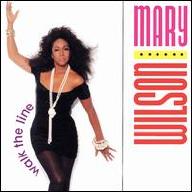Born in Greenville, Mississippi, Mary Wilson also lived with her family in St. Louis and Chicago until the age of three, when was sent to stay with her aunt and uncle in Southwest Detroit. At the age of 12, by which point her mother had rejoined her, Wilson moved to the city's Brewster-Douglass housing project, where she met Florence Ballard. Through Ballard, Wilson joined the Primettes, who released a single in 1960 before they signed to Motown and changed their name to the Supremes. The group achieved lift-off in 1964, the year they started a streak of five number one pop singles consisting of "Where Did Our Love Go," "Baby Love," "Come See About Me," "Stop! In the Name of Love," and "Back in My Arms Again." In addition to a stack of hit albums, the group topped the pop chart seven more times before Diana Ross left in 1970 for a solo career. Wilson continued to be the linchpin of the Supremes and saw the group through numerous lineup changes. While they weren't as successful during the '70s as they had been the previous decade, the Supremes' post-Ross output -- highlighted by eight additional Top 40 hits, from "Up the Ladder to the Roof" through "I'm Gonna Let My Heart Do the Walking" -- has a fervent following.
Two years after the Supremes' farewell concert in 1977, Wilson started a solo career with the Mary Wilson album. Produced by longtime Supremes collaborator Hal Davis and released on Motown, the LP featured a charting single with the midtempo disco cut "Red Hot," and peaked at number 73 on Billboard's Top Black Albums chart. In 1983, Wilson briefly reunited with Supremes partners Diana Ross and Cindy Birdsong (who had replaced Florence Ballard) to perform "Someday We'll Be Together," the group's last chart-topper, for the television special Motown 25: Yesterday, Today, Forever. Three years later, Wilson became a published author with Dreamgirl: My Life as a Supreme, a New York Times Best Seller. (The title referenced Dreamgirls, the Broadway musical inspired in part by Wilson's group.) Wilson would publish three more books, namely Supreme Faith: Someday We'll Be Together; a combined and updated edition of her first two books; and Supreme Glamour.
Although Wilson was active primarily as a performer and went on to hold a popular Las Vegas residency, she made a second album, Walk the Line, released in 1992, and recorded a handful of singles into the latter half of the 2010s. As an activist, among many other endeavors, Wilson lobbied for the Truth in Music Advertising Act and the Music Modernization Act. In 2019, the year her last book was published, she competed on Dancing with the Stars. At the time of her death from heart disease on February 8, 2021, Wilson was working on an expanded reissue of her self-titled album. It was released digitally two months later with material from a 1980 session and a new track, the message song "Why Can't We All Get Along." Those solo recordings, along with a selection of well-known, deep, and previously unreleased Supremes songs, were compiled on the two-disc Motown Anthology, released in 2022. ~ Andy Kellman, Rovi

















